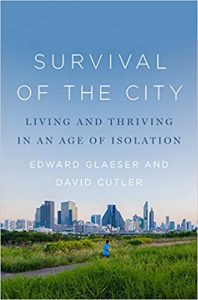For obvious reasons there is a lot of debate about the future of cities, after 18 months when many of us have been stuck at home, and much speculation about whether there will ever be a return to commuting into dense city centres for work. The answer given in Survival of the City by Ed Glaeser and David Cutler is yes – probably. The basic reason is the role face-to-face interactions play in creating economic value, all the more so as increasing automation changes the kinds of jobs left to humans. Creativity, care, tacit knowledge – all require personal interaction. These long months on Zoom have depleted past stocks of social and organisational capital.
The ‘probably’ part, though, is that how successful cities will be depends on some key issues. Foremost among them is managing infectious disease. The book starts with epidemics in history and documents the ways cities have battled their effects, such as clean water and adequate sewage, not to mention the broader provision of good public health systems. For example, drug epidemics and pollution are usually urban blights. However, other aspects of city management are important too. The book singles out crime prevention, adequate supply of housing, and education provision too, for example (not least because the average level of education in a city is a strong predictor of life expectancy for its low income inhabitants even though they are generally not the most highly educated).
In a nutshell, the authors write: “A central theme of this book is that the vulnerability of large, dense, interconnected cities requires an effective, pro-active public sector.” Indeed. And the book ends with a series of recommendations: a “NATO for health”, effective across borders in a way WHO is not; better public health provision; education services that improve opportunities for those who are currently losing out in city life; and (this is a very US-focused book) criminal justice system reform.
I enjoyed reading it, not least because it speaks to my own instincts or prejudice about the role of cities. Lots of great detail too. Who knew the US health system might have been reformed in the 1960s if the then chair of the House Ways and Means Committee, Wilbur Mills, had not been caugh drunk driving with an Argentinian stripper called Fanne Foxe at 2am, and tried to escape the police by jumping into the river? Or that Bayer used to sell heroin as a safe alternative to opium. Or that ‘watered stock’ literally used to be cattle given a lot of water to drink so that they appeared to be fatter?
I’m talking to the authors on 20th October as part of Bristol’s Festival of the Future City – bound to be an interesting discussion.

